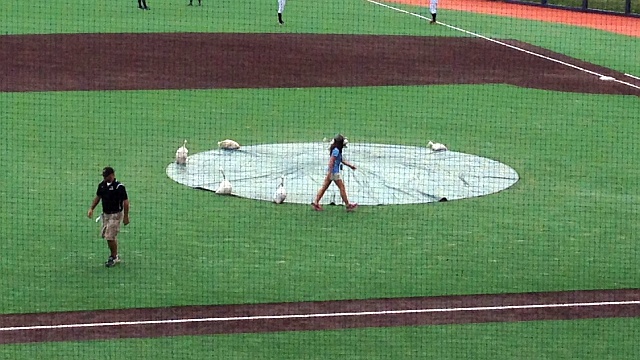Groundskeeper faces different issues in WV
Like "Underwater Firefighter" or "Bald Hairstylist," "Artificial Turf Groundskeeper" sounds like the sort of job that, by its very definition, shouldn't exist.
If the grounds are artificial, what is there to keep?
This question isn't as existential as it seems, which I learned firsthand last month while visiting brand-new Monongalia County Ballpark. Located in Granville, just outside of Morgantown, Monongalia County Ballpark houses the New York-Penn League's West Virginia Black Bears as well as West Virginia University's Big 12 baseball program. With the exception of the clay pitcher's mound, the entirety of the Monongalia County Ballpark playing field is synthetic.
Nonetheless, the Black Bears still employ a full-time groundskeeper: Morgantown native Craig McIntosh. To hear him tell it, synthetic surface or not, there's still plenty of work to be done.
"You have to clean the field, and you have to sweep it," said McIntosh. "Picking up debris off the field is a lot of it."
So what constitutes such debris? In a (literal) nutshell, it's the myriad detritus that is dropped, spit and kicked onto the field by players.
• Views, quirks and pepperoni at West Virginia's new ballpark »
"It's any kind of trash that's on there -- and then sunflower seeds, or gum," said McIntosh, who previously worked for the Washington Redskins as well as Morgantown's Mylan Park. "Anything that the players leave behind, we pick it up and then sweep around the field. Some of these guys have bobby pins in their hair, and that's a problem if you leave those around the field. Things like that, metallic things.
"With a natural field, things will wear down into the field," he continued. "With [a synthetic surface], it's just going to sit here -- it's not going anywhere. These guys [the Black Bears players], they learn pretty fast. Everyone learns the rules."
McIntosh has other duties as well, which the average fan might not immediately associate with the job of groundskeeping.
"We've got to do maintenance around the facility, maintain the landscaping all around," he said. "And then there's setting up batting practice, tearing it down, making sure everybody's got what they need and are ready to go."
But not all job duties are created equal. Prior to interviewing McIntosh, I had heard one of his Black Bears co-workers jokingly accuse him of having a "mound fetish." Though surrounded by the synthetic, the mound is real, and it is McIntosh's job to keep it spectacular.
"Yes, a lot," said McIntosh, acknowledging that he does indeed have a mound fetish. "People think [maintaining the mound] is all you have to do, so you don't want to have that slip through the cracks. I never want to hear, 'You had one job.'"
McIntosh would definitely hear such criticism if he ever failed to protect the mound during a rain delay.

"We actually have to use a [home] plate tarp for our mound, because there's a concrete wall around the mound that holds the turf in," he said. "A normal [mound] tarp comes off the concrete wall and water pools down below."
But that's the only tarp that McIntosh -- and the entire Black Bears front office -- has to deal with.
"I'm not missing tarp pulls in the slightest," he said.
Clearly, then, there are benefits to not keeping it real. McIntosh, for his part, finds himself content to maintain the synthetic.
"I'd never worked in Minor League Baseball before, but this was a great opportunity," he said. "I'm from Morgantown, it all seemed to fit. We've got good people all around us. How could you not be a part of this chance?"
Benjamin Hill is a reporter for MiLB.com and writes Ben's Biz Blog. Follow Ben on Twitter @bensbiz.
